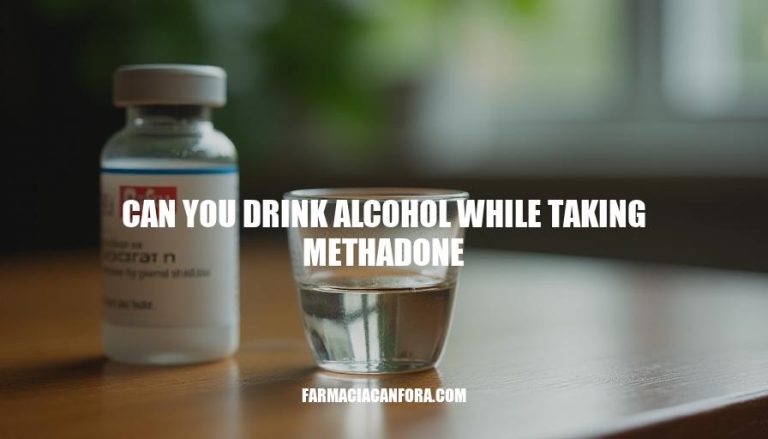


Methadone is a type of opioid that helps people with addiction feel better when they’re going through withdrawal. It works by acting on the same parts of the brain as other opioids. But if you take methadone and drink alcohol, it can be very bad for you.
The two together can slow down your breathing, lower your blood pressure, and even put you in a coma. So it’s really important to understand how these two things interact with each other so we can keep people safe and help them get better.
Methadone is a synthetic opioid medication used primarily for two purposes: pain management and treatment of opioid use disorder (OUD).
Medical Use: Methadone is prescribed for severe pain that does not respond to other treatments. It is particularly effective for chronic pain conditions such as neuropathic pain and cancer pain.
Mechanism of Action: Methadone works by binding to the mu-opioid receptors in the brain and nervous system, mimicking the effects of natural opioids like endorphins. This action helps to alleviate pain and also blocks the euphoric effects of other opioids, reducing cravings and withdrawal symptoms in individuals with OUD.
Additionally, methadone acts as an NMDA receptor antagonist, which helps in reducing tolerance to opioids and improving pain relief.
Opioid Addiction Treatment: Methadone is used in medication-assisted treatment (MAT) for opioid addiction. It helps individuals reduce or quit their use of heroin or other narcotic drugs by preventing withdrawal symptoms and reducing cravings. Methadone maintenance treatment (MMT) involves a long-term, supervised program where patients receive daily doses of methadone under medical supervision.
This approach helps individuals stabilize their lives and engage in counseling and other support services to aid in their recovery.
Prescription Reasons: People are prescribed methadone for opioid addiction treatment to manage withdrawal symptoms, reduce cravings, and prevent relapse. It is also prescribed for severe pain management when other treatments have been ineffective. Methadone treatment programs are highly regulated and involve regular monitoring, counseling, and drug testing to ensure patient progress and safety.
Methadone and alcohol are both central nervous system depressants, and combining them can lead to significant pharmacological interactions. When taken together, alcohol can affect the metabolism and efficacy of methadone in several ways.
Firstly, alcohol can inhibit the metabolism of methadone, leading to increased levels of methadone in the blood. This can enhance the effects of methadone, potentially causing greater sedation and respiratory depression.
Conversely, chronic alcohol use can induce liver enzymes that metabolize methadone, potentially reducing its efficacy.
The combination of methadone and alcohol increases the risk of severe side effects and complications. These include respiratory depression, where breathing becomes slow and shallow, which can be life-threatening. Other potential side effects include low blood pressure, weakened heart rate, dizziness, drowsiness, impaired motor control, nausea, vomiting, and even coma.
Moreover, the risk of overdose is significantly heightened when methadone and alcohol are taken together.
Overdose can result in severe respiratory depression, loss of consciousness, and death.
It is crucial for individuals taking methadone to avoid alcohol consumption to prevent these dangerous interactions and ensure the safe and effective use of methadone in managing opioid addiction or pain.
Mixing alcohol with methadone can lead to severe health risks due to the combined depressant effects on the central nervous system. This combination can cause extreme drowsiness, dizziness, impaired coordination, and significantly increase the risk of overdose. Additionally, it can lead to respiratory problems, low blood pressure, a weak heart rate, and even coma.
The side effects of both substances are not eliminated when taken together, so symptoms like anxiety, insomnia, weakness, sweating, and vomiting may also be experienced.
It’s crucial to avoid alcohol while taking methadone to prevent these dangerous complications.
Mixing methadone and alcohol can lead to serious health risks, including respiratory problems, low blood pressure, and even coma. It’s crucial to consult your healthcare provider before consuming alcohol while on methadone. Follow their advice closely to avoid dangerous complications and ensure your safety.
Methadone is a synthetic opioid medication used for pain management and treatment of opioid use disorder (OUD). It works by binding to mu-opioid receptors in the brain, mimicking natural opioids like endorphins. Methadone maintenance treatment involves daily doses under medical supervision to help individuals stabilize their lives and engage in counseling.
Combining methadone with alcohol can lead to severe health risks due to the combined depressant effects on the central nervous system. This combination can cause extreme drowsiness, dizziness, impaired coordination, and significantly increase the risk of overdose. Additionally, it can lead to respiratory problems, low blood pressure, a weak heart rate, and even coma.
The side effects of both substances are not eliminated when taken together, so symptoms like anxiety, insomnia, weakness, sweating, and vomiting may also be experienced. It’s crucial to avoid alcohol while taking methadone to prevent these dangerous complications.
If you’re taking methadone, it’s essential to consult your healthcare provider before consuming alcohol. They can provide personalized guidance on how to safely manage your medication and reduce the risk of adverse interactions. Don’t take matters into your own hands – seek professional medical advice to ensure your safety.